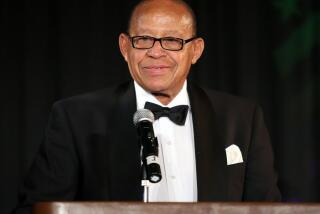Ralph Wiley, 52; Sportswriter and Author of Books on Race
- Share via
Ralph Wiley, a leading sportswriter for Sports Illustrated and ESPN.com who was also a well-regarded essayist on race in America, has died. He was 52.
Wiley died Sunday night of heart failure, according to an announcement on ESPN.com. He was stricken at his home in Orlando, Fla., while preparing to watch game four of the NBA finals between the Los Angeles Lakers and Detroit Pistons.
A regular commentator for ESPN’s SportsCenter and a columnist for ESPN.com’s Page 2, Wiley started his journalism career at the Oakland Tribune after graduating from Knoxville College in Tennessee with a degree in business management. The Memphis native began as a copy boy and worked his way up to covering the city before landing on the sports desk.
He became a sports columnist for the Tribune and was credited with coining the term “Billy Ball” to describe the style of play favored by Oakland A’s manager Billy Martin in the 1980s. That style was primarily about manufacturing runs through aggressive base-running that included frequent attempts to steal home. The term so well captured the phenomenon that it became the advertising theme for the A’s and was on all their promotions.
Wiley moved on to Sports Illustrated in 1982 and remained there for nine years, writing more than two dozen cover stories focusing on boxing, baseball and football. He also covered the rape trial of boxer Mike Tyson.
In the late 1980s, Wiley turned most of his attention to writing books, including “Serenity: A Boxing Memoir,” which received generally good reviews. As much an autobiography as a survey of the boxing world, the book was written from his boxer uncle Charles’ point of view. It was also populated by such noted boxers as Muhammad Ali, Joe Louis, Tyson, Sugar Ray Leonard and Thomas Hearns.
Wiley’s career as a cultural critic picked up in the 1990s with three books on race in America. “Why Black People Tend to Shout: Cold Facts and Wry Views From a Black Man’s World” turned what Publishers Weekly called “a perceptive eye on the black experience” in America. The book criticized many aspects of U.S. life, including the proclivity to blame blacks for society’s ills. “What do you get out of integration?” he wrote. “You get suspected over everything.”
His provocative manner and pointed satire were not universally admired. Writing in the Los Angeles Times, Alex Raksin said Wiley’s book found “just the right tone” for a discussion of racial issues. But Karin D. Berry, in Emerge magazine, criticized the book for its “detailed, rambling asides that were distracting” and said the essays lacked focus.
Wiley also wrote “What Black People Should Do Now: Dispatches From Near the Vanguard” and “Dark Witness: When Black People Should Be Sacrificed (Again).”
A writer in The Times said essays in “What Black People Should Do Now” “delivered sharp swipes at just about anyone who’s lingered a little too long in the public eye: from wildly successful black women writers to the dubious effectiveness of the black leadership to the predominantly white world of publishing and the comparably monochromatic law enforcement/judicial system.”
The book included a critical examination of the Tyson and William Kennedy Smith rape trials. “If Mike Tyson cannot force himself on you,” Wiley wrote, “but William Kennedy Smith ... can, where’s the progress, really?”
“Dark Witness” was notable for its essay ridiculing the authors of “The Bell Curve,” which proclaimed blacks intellectually inferior, and for a less than flattering portrait of O.J. Simpson, whom Wiley knew from working at NBC in the late 1980s.
The writer’s other books included one with director Spike Lee on the making of the film “Malcolm X.” Wiley was also co-author of a biography of baseball player Eric Davis and a memoir by Dexter Scott King.
He is survived by a son and a daughter; and his mother, Dorothy Brown of Washington, D.C.
More to Read
Go beyond the scoreboard
Get the latest on L.A.'s teams in the daily Sports Report newsletter.
You may occasionally receive promotional content from the Los Angeles Times.










